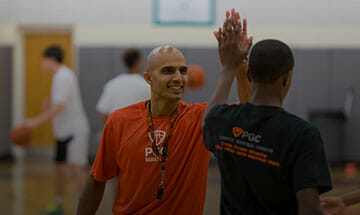The PGC Blog
Brought to you by
Basketball Blog: Attitude….Defined
Attitude is probably the most important aspect of the game. What is your attitude? All of us have a good attitude when things are going well; when we’re the stars of our teams and winning big games, but what’s your attitude when your team is losing?
How to Make Your Coach Love You
Let’s be honest, who doesn’t want a little extra love? If you want to be loved by your basketball coach (and this can apply to your teachers, a boss, or even your parents), follow these three simple rules.
Developing a Positive Team Culture
I recently spent the day at the Psychology of Coaching Teams Conference in Boston, MA. It’s an all day event for coaches of any sport and it features some great speakers with vast experiences. I am committed to a life of education that is fueled by my insatiable hunger for growth. I find myself growing on a daily basis, but it’s events like these that really fuel my fire.
Athlete Testimonials
Check out some of PGC’s Athlete testimonials.
Six Types of Toughness: Are You Tough Enough?
ESPN’s Jay Bilas wrote a terrific blog during last year’s basketball season about the often used (yet often misunderstood) word in sport – toughness. It was one of the best blogs I’ve ever read, and a viral buzz was created because of it. Here are some key, bullet point thoughts about this word.
Falling Head over Heels (in love) Might Just Get You to the Pros
Fall in love – I’m talking about falling HEAD OVER HEELS in love – and you’ll be a better basketball player. Now, some of you may be thinking I just met the woman of my dreams, but I actually just finished a clinic in Eastern Washington and there I met the woman… (No-no-no, I’m just kidding, only the clinic part is true.)
Pavlovian Basketball
Basketball is a thinking game but, as a coach, one of your major responsibilities is to take as many situations as possible out of thought processes and turn them into quick
Why Excuses are So Bad
Excuses hurt teams, not just because they waste time and kill team morale (and a coach’s morale), but because they reveal that the player making them has a very off-line focus. An excuse-maker can’t possibly be using his energy thinking about how to enhance what is going on or about to go on because, obviously, he is putting his time into explanations and justifications.









